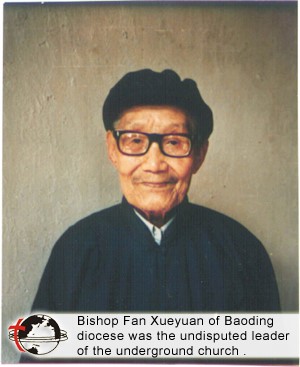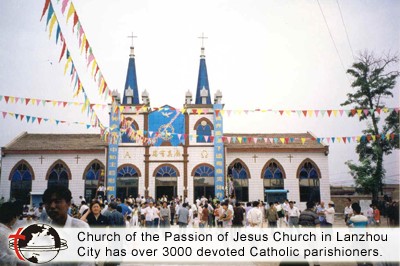
China Bridge (神州橋樑)_2004/Mar
A Time for Reconciliation
The Scriptures tell us that there is “a time for every affair under the heavens.” Is it not perhaps time for the official and unofficial expressions of the church in China to be reconciled to each other? Are there any signs to indicate that the two communities might be willing and eager to start this process seriously? Lent is an ideal time to address the need of reconciliation. After all, it is the time of year when the Church goes all out in her liturgy and evangelisation to remind us that through his suffering and death, Christ has reconciled us to God. This year, especially, may be an ideal time since so many people in the world are being reminded of this fact through Mel Gibson’s film, “The Passion of the Christ”.
So long as the Church in China is divided within itself, it is weak. So long as it remains divided, it becomes weaker and weaker daily, and by default, it is inadvertently doing the work of the government that seems to want to keep the Church divided.
Origins of division
How did this situation of division come about in the Church in China? In 1978, the Congregation for the Evangelisation of Peoples, concerned about the situation of the Church following the Cultural Revolution, gave the clergy and laity in Mainland China certain privileges. These privileges were basically an extension of the privileges already granted to Church leaders in the 1950s. These privileges were rather comprehensive, giving priests the permission to administer the sacraments beyond the borders of their own dioceses. Because of the shortage of priests, Rome also allowed bishops to ordain young men without much, if any, theological formation, provided, of course, they were characterised by charity, had a strong faith, were willing to abide by the rule of celibacy, were loyal to the Pope and willing to abide by Church teaching.
Rehabilitation of the innocent
In the aftermath of the Cultural Revolution and after taking a good look at the devastation that had afflicted the country during those 10 turbulent years, the government decided to start rehabilitating some of the innocent people who were languishing in prisons throughout the country. Among these, of course, were many bishops, priests, and laity. Some had actually been in prison since the 1950s shortly after Mao came to power.
The underground community
On 14 January 1980, among those released from prison was Bishop Fan Xueyan of Baoding, Hebei Province. Bishop Fan had been ordained a priest in Rome in 1934. He returned to China in 1935 and in 1951 Pope Pius XII appointed him a bishop. His life as a bishop was anything but peaceful. In 1958, he was sent to a labour camp for his loyalty to the pope and his opposition to the Catholic Patriotic Association. He was released 11 years later and returned home. This respite was short-lived. Suspected of being counter-revolutionary, the bishop was arrested again in 1978, released on 14 January 1980, and re-instated as Bishop of Baoding. He was re-arrested in April 1982, released in 1988 but placed under house arrest. In November 1990 during a crackdown on the unofficial Church, Bishop Fan disappeared and was never seen alive again.
Leader of the unofficial Church
Bishop Fan is recognized as the undisputed leader of the unofficial Church in China. What has given the underground Church so much of its strength is that Bishop Fan, without having secured the permission of Rome beforehand, but seeing the plight of the Church, and the aging of the bishops, decided to ordain some bishops secretly. Aware of the situation of the Church in China, Rome gave the sign that it recognized and approved these ordinations. These bishops later ordained other men as bishops.
CPA gains strength
As the Catholic Patriotic Association began to regain its strength following the Cultural Revolution, it also began to exert more and more control over the official Church, the segment that had decided that it was imperative to provide the faithful with the church’s pastoral services. The faithful were in need of the sacraments, especially of the Eucharistic celebration. The unofficial church, for its part, became more and more convinced that it had to continue to play its prophetic role in the Church by refusing to cooperate in any way with the Communist, atheistic government. In this way, it set itself in opposition to the officially recognised church.
As the years have passed, it seems to become clearer and clearer that what unites the two communities is much stronger and much more important than what divides them. They are one in faith, one in doctrine and more and more one in total loyalty to the Holy Father. Division is imposed on them from the outside; it is not religious, it is political.
A call to reconciliation
Since there are so many changes taking place in China today and on so many different levels, what could signal a paradigm shift between the two communities and begin the process of reconciliation? There are some hopeful signs. A number of seminarians in the unofficial Church have joined their counterparts in seminaries of the official Church where they can receive a better grounding in the faith and in the studies required for ordination to the priesthood. In Hebei province, the stronghold of the unofficial Church, a bishop in the official Church, Bishop Feng Xingmao, who is recognised by Rome, has been welcomed as the titular head of the Hengshui Diocese, by Bishop Jia Zhiguo, who was himself originally ordained by Bishop Fan in 1981. This is a significant step forward. Bishop Jia has urged the Catholics to welcome the newly appointed bishop, saying, “A bishop appointed by the Pope must be recognised.” Although the great majority of the bishops presently leading the official church are recognized by the Holy Father, up until very recently this legitimacy by Rome was never publicised. This is also changing. At Bishop Feng’s ordination on January 6, not only did the young priests openly reveal Rome’s approval of their Bishop but insisted on reading the Pope’s letter of appointment at the consecration. After hours of negotiations, the young men won the day!
“Letter to my friends”

Perhaps one of the main signs that things are changing comes from a letter of the young and newly installed bishop of Lanzhou, Joseph Han Zhihai. Bishop Han is the successor of the old Bishop Philip Yang who died in 1998.
In a letter entitled, “Letter to my friends,” Bishop Han explains the attitudes that have ruled the minds and hearts of many in the unofficial Church over the years. He says that for a long time the members of the unofficial church feared that those priests and bishops in the official Church, perhaps misguided by the Patriotic Association, might have caused a schism in the Church by creating an independent Catholic Church. “We refused,” he says, “to join them in their Eucharistic celebrations and we encouraged our Catholics to do the same because it is our duty to protect the unity of the Church with the Universal Church and with the Holy Father.”
In the teachings of Jesus, reconciliation usually comes about through the initiative of the victim not the oppressor. In the case of China and the divided church, it is not so clear who is the victim and who is the oppressor. Both seem to be the victims; the oppressor may lie outside the Church! But in a new and rare confession, the young bishop adds, “We deeply regret that this has caused division inside our Chinese Church …”
Change in attitude
What has changed the thinking of some young priests in the unofficial Church? Bishop Han tells his friends, “Over the past twenty years we have carefully observed the many efforts made by Pope John Paul II to better understand the situation of the Chinese Catholic Church. We felt very much strengthened and comforted by his encouraging words. Later we were told that some of the official bishops, appointed by the Chinese government, were also being legitimated and appointed by the Holy Father …”
Something else that has helped to bring about a change of attitude is direct contact between the two communities. “Over the past years,” Bishop Han writes, “we have, in our diocese, developed occasional contacts with priests and Catholics in the official Church community.” Some, in fact, have even concelebrated the Eucharist together. The bishop says that they did this because they have repeatedly heard that “the Holy Father encourages us, Chinese Catholics, to promote reconciliation and to recreate unity in the Chinese Catholic Church, according to the wish of Our Lord Jesus Christ, who prayed, ‘that all may be one!'” (Jn. 17:11)
The road ahead is long

In spite of the fact that some bishops, priests and many of the faithful are still hesitant about fully accepting each other, much has changed especially during these last years. The unofficial church is now accepting the reality that the vast majority of the leaders of the official Church are united in one faith and are one with the pope. Many are now convinced that they can no longer ignore the prayer at the Last Supper, “that all may be one.”
If all the leaders of the official Church united with the Holy Father, would join together with all the leaders of the unofficial Church and clearly state openly and with courage to their flock that they (the Churches) are one in faith and in union with the Universal Church; if both groups could meet and share their liturgies, together celebrate their unity of faith and doctrine, this would be a big step forward towards reconciliation. China fears that a strong Church means a weak patriotism, but Bishop Han is convinced of the opposite, “Our unity in faith will not in any way diminish our love for our own country. On the contrary, it will strengthen our ability to cooperate altogether for the building up and modernising of our country.” Reconciliation is a process of healing made possible only by the grace of God. Grace is a gift. Such a gift is certainly worth praying for.


 ENG
ENG